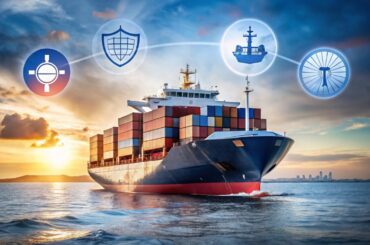When steering through the vast oceans, ensuring proper sewage management is essential to safeguard marine environments. MARPOL Annex 4 serves as a beacon of regulations, guiding ships on preventing pollution from wastewater at sea. From the intricate workings of sewage treatment facilities to the intricacies of compliance measures, every vessel plays a pivotal role in maintaining oceanic purity. Discover how these meticulous standards are not just about following rules but also about preserving the delicate harmony of our seas.
Overview of MARPOL Annex 4
MARPOL Annex 4, also known as the International Convention for the Prevention of Pollution from Ships, focuses specifically on sewage pollution from ships. This annex requires ships to have sewage treatment facilities to prevent harmful discharges into marine ecosystems.
Sewage treatment onboard ships is essential to guarantee that pollutants are adequately removed before being discharged into the sea. By implementing proper sewage treatment processes, the impact on marine ecosystems can be minimized, safeguarding the delicate balance of marine life.
Effective sewage treatment systems onboard ships involve physical, biological, and chemical processes to treat wastewater. These systems are designed to remove contaminants and pathogens from sewage before it’s released into the ocean.
Regulations for Sewage Discharge
Ships operating in international waters must adhere to strict regulations regarding sewage discharge to prevent pollution in marine environments.
MARPOL Annex IV sets guidelines for the treatment of sewage before discharge to guarantee minimal impact on the sea. Vessels are required to have an approved sewage treatment system onboard that meets specific standards. The discharge of untreated sewage is strictly prohibited, and there are clear discharge limits for different zones to control pollution levels effectively.
These discharge limits are based on the vessel’s distance from the nearest land and the number of passengers on board. Ships must regularly monitor and record their sewage discharge to demonstrate compliance with these limits.
Additionally, certain areas, such as Antarctic waters, have even stricter regulations to protect the fragile ecosystems. By strictly following these regulations and investing in proper sewage treatment systems, ships can greatly reduce their environmental impact and contribute to cleaner oceans.
Best Practices for Compliance
For effective compliance with sewage discharge regulations under MARPOL Annex IV, implementing best practices is essential.
To guarantee proper sewage treatment and adherence to compliance strategies, consider the following:
- Regular Maintenance: Conduct routine inspections and maintenance of sewage treatment systems to guarantee they’re functioning at their best.
- Crew Training: Provide thorough training to crew members on the correct operation and maintenance of sewage treatment equipment.
- Record Keeping: Maintain detailed records of sewage discharge activities, including dates, quantities, and treatment processes used.
- Compliance Audits: Conduct regular audits to verify compliance with MARPOL Annex IV regulations and identify any areas for improvement.
Importance of Environmental Protection
When considering the effective implementation of sewage discharge regulations under MARPOL Annex IV, it’s imperative to highlight the paramount importance of environmental protection.
Sustainable practices play a vital role in safeguarding marine ecosystems from the detrimental effects of sewage pollution. By adhering to these regulations, you contribute to the preservation of biodiversity and the overall health of our oceans.
Implementing sustainable practices not only guarantees compliance with international regulations but also fosters a culture of responsible stewardship towards the environment.
Marine ecosystems are delicate and intricate systems that rely on a delicate balance to thrive. Discharging untreated sewage into the sea disrupts this balance, leading to widespread pollution and harm to marine life.
Frequently Asked Questions
Can Sewage Be Discharged at Any Time Under MARPOL Annex 4?
You cannot discharge sewage at any time under MARPOL Annex 4. Compliance guidelines specify the timing and conditions for safe discharge. Understanding these regulations is essential to prevent pollution and maintain environmental standards while at sea.
Are There Penalties for Non-Compliance With Sewage Discharge Regulations?
If you fail to comply with sewage discharge regulations, enforcement mechanisms may be applied, including financial penalties. It is essential to adhere to these rules to avoid repercussions and protect the marine environment from pollution.
How Often Should Sewage Treatment Systems Be Inspected on Ships?
To guarantee compliance, sewage treatment systems on ships should be inspected regularly. The inspection frequency depends on system complexity, but typically, inspections should be conducted quarterly or biannually to verify proper functioning and prevent pollution.
Is There a Limit to the Distance From Shore for Sewage Discharge?
When discharging sewage at sea, remember the shore distance and discharge zones. Guarantee compliance with regulations to prevent pollution. Be aware of the limits set by MARPOL Annex IV to safeguard marine environments and human health.
What Are the Common Challenges Faced in Implementing MARPOL Annex 4 Regulations?
When it comes to sewage treatment, challenges like outdated infrastructure, high costs, and limited resources hinder effective implementation of MARPOL Annex 4 regulations. These issues directly impact the environment, exacerbating pollution concerns at sea.







